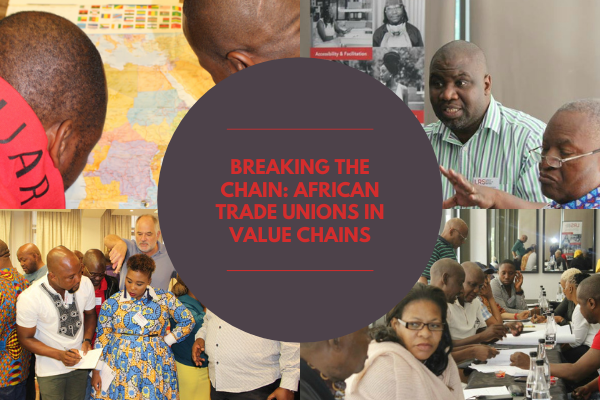We supported trade unions in ten countries in sub-Saharan Africa to renew their bargaining and organising strategies for tackling inequality in global value chains.
The LRS Value Chains Capacity Building Project works with established trade union networks in Africa, supporting their ability to develop renewed strategies for organising and bargaining to confront inequality in global value chains.
Target group
The primary target group is trade union officials and worker leaders in UNI Global Africa-led Shop Stewards Alliance networks. The project set out to build on the potential of the three Multinational Corporations (MNC) retail networks by introducing the UNI Global Union in Africa and its affiliates to value chain analysis. The three South African MNCs (Shoprite, Pick n Pay and Massmart/Walmart) are among the dominant retail role players in the regional value chains and reportedly employ over 250,000 workers in Africa.
Project objectives
Trade unions involved in the project have developed ideas for the expansion of their negotiating power and their organising range along the value chain. They are thus better able to counter inequalities along the value chain and to ensure that core labour standards and social standards are respected and the working conditions and the standard of living of workers and their dependents in sub-Saharan Africa are improved.
The work
57 participants (60% male, 40% female) covering 10 countries and 11 trade unions organising in the retail sector participated in the value chains project, which was implemented from 2017 to 2019, with the support of The German Trade Union Confederation, DGB Bildungswerk Bund.
The participating countries were South Africa, Lesotho, Mozambique, eSwatini, Zambia, Botswana, Zimbabwe, Kenya, Tanzania and Uganda.
Outcomes
The project outcomes achieved through workshops and research outputs include;
- Developing an understanding of value chain analysis within trade unions in Africa
- Translating value chain analysis for trade unions
- Reflecting on the implications of value chain analysis for two key functions of trade unions – collective bargaining and organising.
Top 5 arising themes
- Mapping workers in the value chain -> improved understanding of recruiting processes and the types of workers and jobs in a value chain
- Unequal power in the value chain -> identified strategies for confronting the power imbalance across value chains
- Value chain mapping tools -> the effective tools for mapping all workers across the value chain
- Collaboration -> firm commitments to sharing information within unions and between countries across to support organising and collective bargaining processes
- Laws and policies -> do they support or disrupt union organising?
Project impact
Key project contact: Trenton Elsley | [email protected]
- Breaking the Chain: Value chain analysis as a tool for renewing trade union bargaining and organising strategies | Extracted from LRS Bargaining Indicators 2019
- Global framework agreements for Africa – Using the space created







